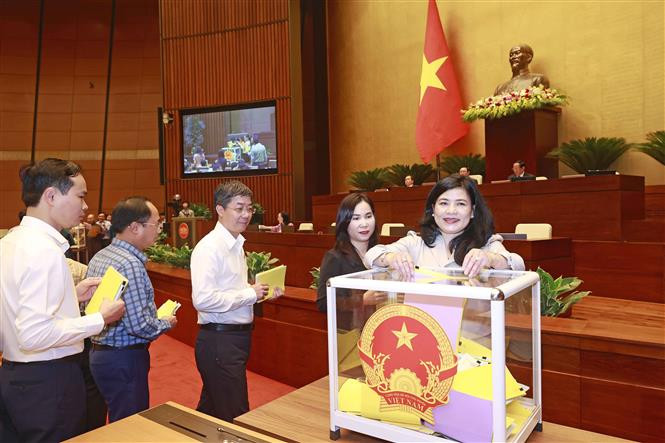People put their trust in the leadership of the Party and the management of the State, first of all looking at the leaders of each locality, agency, and unit.

In just one month, our Party has issued two regulations related to the authority of the leader. These are Regulation No. 142-QD/TW on piloting the delegation of authority and responsibility to the leader in personnel work (Regulation 142) and Regulation No. 148-QD/TW on the authority of the leader in temporarily suspending the work of subordinates in necessary cases or when there are signs of serious violations of Party regulations and State laws (Regulation 148).
According to Regulation 142, the head has the right to introduce 1 person for 1 elected position, appoint deputies from both local and other sources, and introduce personnel to elect additional members of the Standing Committee of the Party Committee when there is a vacancy in the number of Standing Committee members. Regulation 142 also allows the head to consider appointing and dismissing the heads of organizations, agencies, and units at the administrative level under his/her direct management according to regulations.
According to Regulation 148, the head, based on the authority prescribed by the regulations, has the right to decide to temporarily suspend the work of a subordinate officer in case the subordinate officer shows signs of serious violations such as being prosecuted to serve the investigation or in the process of reviewing and handling the violation of the officer, there is a basis to determine that disciplinary action from warning or higher or handling by criminal law is required, and the inspection, examination, audit, investigation, prosecution, trial, and execution agency has a written request to temporarily suspend the officer from work. It is noteworthy that Regulation 148 also allows the head to have the right to decide to temporarily suspend the work of a subordinate officer in some necessary cases such as the officer has a violation of moral qualities, lifestyle causing negative impact, public outrage, and bad influence on the reputation of the organization or individual; Officials deliberately delay, shirk responsibility, and fail to perform work within their authority according to their assigned functions and tasks; officials who engage in corrupt, negative behavior, causing trouble for people, businesses, agencies, and organizations in the process of performing official duties...
Along with increasing the authority of the head, both Regulation 142 and Regulation 148 provide regulations on the responsibility and handling of responsibility of the head. For example, when introducing personnel, the head must ensure the standards, conditions, political qualities, ethics, lifestyle, and working capacity of the personnel he/she introduces and must be responsible for his/her decisions, even when he/she has transferred to another job or retired in cases such as introducing cadres for election or appointment without impartiality and objectivity; not ensuring the standards, conditions, political qualities, ethics, lifestyle, and working capacity. In terms of temporary suspension from work, the head can only make relevant decisions based on the grounds stated in Regulation 148. In other words, when given increased authority, the head is also bound by his/her responsibilities and will be handled if he/she makes a mistake.
The head of a locality, agency or unit is the person who is authorized to carry out the task of leading, managing and operating all activities in the locality, agency or unit. They play an important role, deciding the results of leadership, management and organization of the implementation of political tasks of the locality, agency or unit. As the person with the highest authority, they must also bear primary responsibility for the activities of the locality, agency or unit under their charge.
Reality shows that most leaders comply with the law, have a firm grasp of their assigned duties and responsibilities, and lead localities, agencies, and units to carry out their tasks and plans effectively. However, there are still cases where leaders appoint relatives and acquaintances who lack the criteria, or are not even in the planning, so that when they are transferred or retire, their "cronies" take over to ensure they "land safely", and can even "move behind the scenes". There are also cases where officials have poor ethics, a loose lifestyle, shirk responsibility, and harass people and businesses, causing negative impacts, but the leaders cannot do anything because the "collective leadership" does not go hand in hand with the "individual in charge".
Therefore, Regulation 142 and Regulation 148 are considered a breakthrough, ending the long-standing situation where no individual is held responsible for mistakes in personnel introduction as well as the situation of cadres "self-evolving" and "self-transforming" causing public outrage and causing work stagnation in localities, agencies and units... These regulations clearly demonstrate the consistency between the Party's regulations and the State's laws, while meeting practical requirements, clearly defining the authority and responsibility of the leader.
People put their trust in the leadership of the Party and the management of the State, first of all looking at the leaders of each locality, agency and unit. If the leader is clean, not greedy, devoted to the legitimate rights and interests of the collective, resolutely fights against corruption and negativity and uses his power in accordance with regulations, the results will be great, especially in terms of strengthening the people's trust in the Party and the State. To do that, one of the key and important issues is that the leader must constantly cultivate, train, improve his qualifications and responsibilities and always keep in mind that dedication is the most important. Regarding this issue, during his lifetime, President Ho Chi Minh once said that the leader must "be the leader, be exemplary, practice criticism and self-criticism to set an example for everyone".